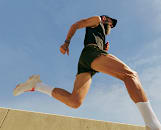
Reilly Wardrope / Moment via Getty Images
What to Eat After a Run, According to Sports Dietitians
You may not be as picky about what you eat after running compared to what you eat before, but your post-run snack is key for kickstarting the recovery process.
By Sarah Klein•
The Benefits of Eating After a Run
What to Eat After a Run
Is There a ‘Best’ Time to Eat After Running?
The Takeaway
Runners have practically as many superstitions about what to eat before a run as baseball players have at-bat rituals. Some swear the perfect pre-run fuel makes the difference between a personal best and a sidelining bout of runner’s stomach.
Discover more ways to reach your goals with Peloton
But runners don’t always have such strong feelings about what to eat after a run. After all, it’s just about refueling with whatever you want, whenever you want it, right?
Well, it’s not quite that simple. As it turns out, there are some benefits of preparing the perfect post-run snack or meal—which, in practice, is simpler to do than you might imagine. “I think of it as the three Rs: refuel, rehydrate, recover,” says sports dietitian Umo Callins, RDN, of Well Rooted Health and Nutrition. “Carbs, electrolytes and fluid, and protein are all incredibly important.”
Here, learn more about what to eat, when to dig in, and why it’s worth it—even when you’re not very hungry.
The Benefits of Eating After a Run
As every runner knows, running takes a lot out of you, draining your body of energy. When you run, your body functions a bit like a car. “Every time you drive, its fuel tank gradually lowers. Similarly, after a run, your body’s tank is depleted,” explains sports dietitian Roxana Ehsani, RD.
Instead of burning through gas, your body burns through stores of carbs and fluids (plus electrolytes). Replenishing these crucial fuel sources after a run “will jump-start your recovery,” she says.
But what makes these elements so beneficial for the post-run recovery process? For starters, re-upping on carbs and fluids ensures you’re ready to go for your next training session (let alone have the energy to get through the rest of your day!), according to the National Academy of Sports Medicine. Plus, when you show up to that next run hydrated and energized, you’ll perform better and with a lower risk of injury.
In addition to consuming plenty of carbs and fluids, you should also get some protein after a run. Even though running doesn’t build quite as much muscle as strength training does, it still causes micro tears in your muscle fibers. Getting a little protein in after a jog can help repair those muscles, building them back stronger in the process, Ehsani says. Again, you’ll show up more prepared for your next run if you’ve given your muscles the protein they need to recover ahead of time.
Try a Guided Running Class on the Peloton App
What to Eat After a Run
No matter which specific foods you ultimately decide to enjoy, you’re going to want to focus on carbs and protein after a run, specifically in a 3:1 ratio of carbs to protein, Ehsani says. “This ratio of macronutrients provides the necessary nutrients for recovery: carbohydrates to replenish glycogen (your energy stores) and protein to repair lean muscle tissue.” Remember, you also want to make sure you’re getting enough fluids with electrolytes to replace what you lost during your run.
The longer and harder you run, the more your energy stores will be drained, Callins says, just like your car’s gas tank after a long drive. That means what and how much you should eat after a run “varies depending on the distance, the intensity, and the duration,” she notes. For shorter runs, rehydrating is most important. After runs lasting 60 minutes or longer, getting carbs and protein is even more important, Ehsani says.
As long as you’re keeping those goals in mind, you can eat pretty much anything you enjoy. And of course, what you eat also depends on what else you have going on in your life and what you have access to, Callins says. If you took a run on your lunch break at work, you’re probably not cooking a full meal after—but you may have strategically stashed a banana and a protein bar at your desk to enjoy during your next meeting.
Need a little inspiration? Here are some go-to snack and meal ideas dietitians and health experts recommend for what to eat after a run.
1. Chocolate Milk
“A glass of low-fat or lactose-free chocolate milk has the right 3:1 carb-to-protein ratio shown to help muscles recover quickly,” Ehsani says. “It provides carbohydrates for energy, protein for muscle repair, naturally occurring electrolytes like sodium and potassium to replenish electrolytes lost, and fluids to rehydrate.”
2. Pancakes
A carb-rich option, pancakes can be enhanced with all sorts of toppings to satisfy your nutritional needs. Ehsani suggests berries, a drizzle of almond butter for satisfying fats and some plant-based protein, and a side of low-fat dairy milk for protein. You could also opt for fruit that’s higher in protein, like guava or blackberries.
3. Pickles
Pickles give you plenty of salt, one of the essential electrolytes worth replenishing, Callins says. Just don’t overdo it, because the sodium can add up fast, and enjoy it with some protein, like a deli sandwich.
4. Smoothie
Smoothies are endlessly customizable for your tastes and dietary preferences. Ehsani suggests blending one with dairy or lactose-free milk, a frozen banana, mango, pineapple, and coconut flakes for carbs and protein.
5. Protein Shake + Electrolyte Drink
This liquid combo is Callins’s go-to for getting protein, carbs, and fluids without taxing your stomach too much if you don’t have an appetite after a run. You can find packaged protein shakes and sports drinks to take guesswork out of the equation and then enjoy them together.
6. Chili
Turkey chili with veggies and beans is a more savory suggestion from Ehsani with plenty of carbs and protein. You can make a big batch once and freeze individual portions for post-run reheating.
7. Trail Mix
Nuts and seeds provide plant-based protein and healthy fats to help you feel full. You can enjoy it with a cup of low-fat chocolate milk for more protein and carbs, Ehsani says.
8. Chia Pudding
Prep some chia seed pudding before your run using dairy or lactose-free chocolate milk, and then top it with berries, Ehsani says. Chia seeds may be small, but they’re rich in antioxidants, electrolytes, and plant protein, according to the Cleveland Clinic.
9. Oatmeal
A high-fiber, carb-rich base, oatmeal can satisfy your post-run hunger. Ehsani suggests making it with dairy or lactose-free milk for protein and then topping it with chopped apple and walnuts, but feel free to experiment with different fruit and nut toppings.
10. Hummus, Pita, and Veggies
This refreshing, simple-to-prepare snack packs a punch. Hummus delivers plant protein, while pita chips and veggie dippers provide plenty of carbs, Ehsani says.
Related Articles

Nutrition
What to Eat During a Long Run (Besides Just Gels)

Nutrition
What to Eat Before a Run, According to Dietitians Who Specialize In It

Health
How to Prevent Runner’s Stomach from Ruining Your Next Long Run or Race

Nutrition
What to Eat Before Running In the Morning, No Matter How Much Time You Have to Spare
11. Turkey Sandwich
If you’re up for more of a meal, a deli sandwich “with pickles and all the fixings” offers a good mix of “everything you need, and it’s not really heavy,” Callins says. Pick a protein, spread, and veggie toppings you enjoy, such as turkey with hummus, avocado, spinach, and pickles.
12. Fruit Pouch + Cheese Stick
This packaged pick is a simple on-the-go option. Applesauce is a classic, Callins says, but now you can find many different types and flavors of fruit pouches that deliver plenty of carbs and nutrients. Add some cheese on the side for quick-and-easy protein, she says.
13. Frittata
Whip up a frittata, Ehsani recommends, to cash in on 6 grams of protein per egg. Mix in plenty of veggies like zucchini, carrots, and broccoli for carbs. An omelet or egg scramble works too!
14. Greek Yogurt or Cottage Cheese Parfait
Plain, low-fat Greek yogurt and cottage cheese both have about 11–12 grams of protein in half a cup. Use one of these as your base, and then mix in berries for carbs and granola for some fat to help you feel full, Ehsani says.
15. Banana and Peanut Butter With Milk
Banana and peanut butter are among runners’ favorite food combos. Enjoy this classic pairing with a glass of dairy milk for protein, Ehsani says.
16. Frozen Grapes
Refreshing and rehydrating, a serving of frozen grapes offers water and some carbs, Callins says. Pair a handful with your choice of protein. You can also opt for other fruits like berries, melon, pineapple, and apples, she adds.
17. Crackers or Pretzels
Simple carbs absorb quickly to restore your energy after a run, Callins says. Enjoy a serving of your favorite carb-rich salty snack (think: pretzels or crackers) alongside some protein, like chocolate milk, a cheese stick, deli turkey, or a serving of tuna.
18. Grain Bowl
A starch, like rice or potatoes, plus a protein like chicken or fish, and some veggies tossed together is a classic meal—and a great choice for what to eat after a run, Callins says.
19. Pasta With Protein
Runners can’t go wrong with a bowl of carb-rich noodles, according to Johns Hopkins Medicine. Top the pasta with a protein you enjoy, such as ground beef or turkey, tofu, peas, or salmon, depending on your recipe and preferences.
20. Bagel With Cream Cheese and Smoked Salmon
Name a more carb-y delight for a runner than a bagel. Add some protein with a serving of smoked salmon, or make it a breakfast sammie with an egg and a chicken sausage patty. Serve it with a side of fruit for a replenishing post-run bite.
21. Veggie Burger
Another solid post-run dinner option? Veggie burgers. You’ll get plant protein from the patty and plenty of carbs from the bun, according to Johns Hopkins Medicine.
Is There a ‘Best’ Time to Eat After Running?
So, do you have to chow down as soon as you’ve stopped your running watch? You don’t need to sprint to the kitchen, but you do want to eat something relatively soon after your run, just like how you should try to eat shortly after strength training workouts.
Generally speaking, eating something within two hours after your run is just fine. You can still eat within that famous 30- to 60-minute anabolic window immediately after, but some experts now say that it won’t make much of a difference for recovery or muscle growth compared to eating within two hours after a workout.
But what if you’re really not hungry? After a short run of 20 minutes or less at a comfortable pace, you can probably skip food and just rehydrate, Ehsani says. But after a longer, harder effort, it’s common for many runners to need some time for their appetite to come back, Callins says. If that’s you, try to at least drink something. “Sipping a drink may be easier to tolerate and still helps jump-start the recovery process,” Ehsani says. She suggests chocolate milk in these moments.
Try not to put off eating too long, though. “What tends to happen is that you have the intention of just eating later, and then later becomes, like, four hours later, and here you are very much depleted, running on empty,” Callins says. Plus, “waiting too long to eat or drink anything post-run may delay recovery and could lead to soreness,” Ehsani adds.
The Takeaway
It’s a smart idea to eat some carbs and protein and replenish the fluids and electrolytes you lost while sweating after a run. Aim for a ratio of 3:1 carbs to protein, and try to eat within the two hours or so after you finish running. You can pick from a long list of carb- and protein-rich options, such as a deli sandwich, cottage cheese with fruit and granola, a grain bowl, chocolate milk and pancakes, or a smoothie—or anything else you enjoy that delivers carbs, protein, and electrolytes. If you’re really not hungry, try to at least drink something nourishing and fueling, such as a smoothie and/or a sports drink.

Peloton App
Access thousands of classes with no equipment needed.
This content is for informational and educational purposes only and does not constitute individualized advice. It is not intended to replace professional medical evaluation, diagnosis, or treatment. Seek the advice of your physician for questions you may have regarding your health or a medical condition. If you are having a medical emergency, call your physician or 911 immediately.
Get our latest health stories straight to your inbox
Enter your email to get articles, expert-backed tips, and updates from Peloton sent to your inbox.
By providing your email address, you agree to receive marketing communications from Peloton.
For more about how we use your information, see our Privacy Policy.








